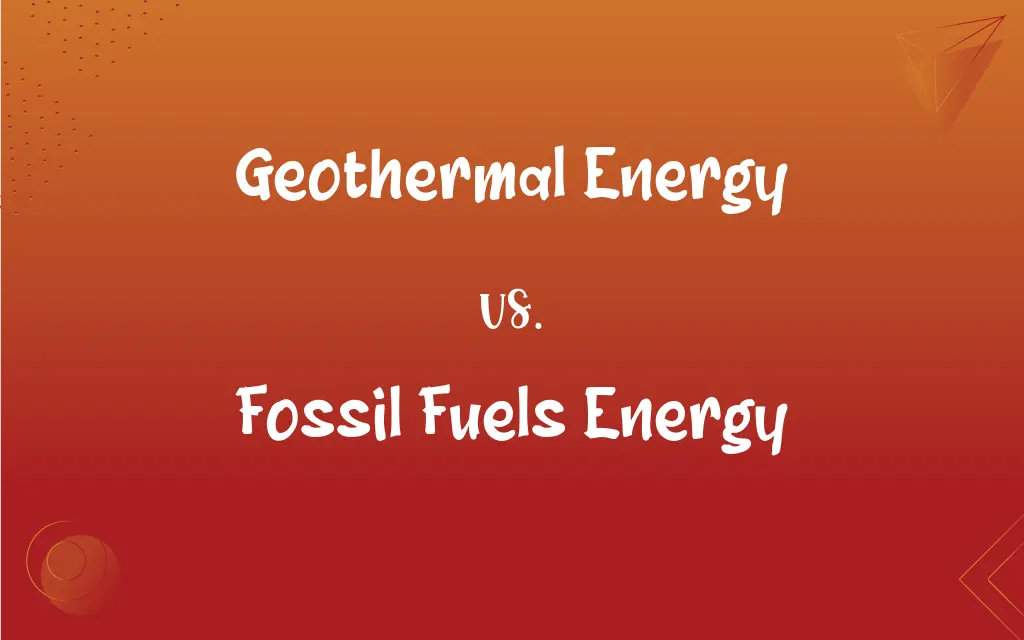Geothermal Energy vs. Fossil Fuels Energy: What's the Difference?
Edited by Janet White || By Harlon Moss || Updated on October 18, 2023
Geothermal energy harnesses heat from the Earth, while fossil fuels energy derives from ancient organic material.

Key Differences
Geothermal energy is the energy obtained by tapping the heat of the Earth's interior. This energy source is clean, sustainable, and environmentally friendly. Fossil fuels energy, on the other hand, is derived from ancient organic materials such as coal, oil, and natural gas. It's a non-renewable energy source that, when burned, emits greenhouse gases contributing to climate change.
Geothermal energy is often associated with regions that have significant volcanic or tectonic activity. It's considered a renewable energy source because the heat emanating from the Earth's interior is essentially inexhaustible on human timescales. Fossil fuels energy, however, is finite and is depleting rapidly due to high global demand. Over-reliance on fossil fuels can lead to energy insecurity.
Harnessing geothermal energy usually involves extracting hot water or steam from the ground, which is then used to generate electricity. This process emits very low amounts of carbon dioxide. Fossil fuels energy production, in contrast, involves burning the fuels, releasing a substantial amount of CO2 and other pollutants into the atmosphere, impacting air quality and health.
While geothermal energy infrastructure can be costly to set up, its operational costs are relatively low, and it provides consistent power. Fossil fuels energy infrastructure, while well-established, faces increasing costs due to resource depletion and environmental regulations. Additionally, the price volatility of fossil fuels can lead to economic challenges.
In terms of environmental impact, geothermal energy has a much smaller footprint compared to fossil fuels energy. While there can be local environmental concerns like land use and minor seismic activity associated with geothermal energy, the global impacts of fossil fuels, such as global warming, are much more severe.
ADVERTISEMENT
Comparison Chart
Source
Earth's internal heat
Ancient organic material
Renewability
Renewable
Non-renewable
Environmental Impact
Low emissions, minor local effects
High emissions, major global effects
Availability
Region-specific (volcanic/tectonic areas)
Widely available but depleting
Cost Dynamics
High initial, low operational costs
Established but facing rising costs
ADVERTISEMENT
Geothermal Energy and Fossil Fuels Energy Definitions
Geothermal Energy
Renewable power from Earth's internal temperatures.
Iceland relies heavily on geothermal energy for its heating needs.
Fossil Fuels Energy
Non-renewable power derived from coal, oil, and gas.
Fossil fuels energy remains a dominant source of global energy consumption.
Geothermal Energy
Earth-sourced heat utilized for power.
Geothermal energy provides a green alternative to fossil fuels.
Fossil Fuels Energy
Energy from burning ancient organic materials.
The industrial revolution was powered largely by fossil fuels energy.
Geothermal Energy
Energy harnessed from below the Earth's surface.
Geothermal energy plants are common in regions with volcanic activity.
Fossil Fuels Energy
Power obtained from ancient buried carbon-rich materials.
The depletion of fossil fuels energy sources is a pressing concern for many nations.
Geothermal Energy
Heat derived from the Earth's core.
The plant uses geothermal energy to generate electricity.
Fossil Fuels Energy
Energy source releasing greenhouse gases when combusted.
The transition away from fossil fuels energy can help mitigate climate change.
Geothermal Energy
Natural warmth from the Earth's interior used for energy production.
The spa uses natural geothermal energy to heat its pools.
Fossil Fuels Energy
Heat and power from long-deceased organic matter.
The city's grid is still predominantly powered by fossil fuels energy.
FAQs
Is geothermal energy renewable?
Yes, geothermal energy is considered a renewable resource.
How is fossil fuels energy produced?
By burning ancient organic materials like coal, oil, or gas.
How does geothermal energy impact the environment?
It has a low environmental impact with minor local effects.
Which countries are the largest consumers of fossil fuels energy?
China, the US, and India are among the top consumers.
What is geothermal energy?
Energy derived from the Earth's internal heat.
Can geothermal energy run out?
While local sites can deplete, the Earth's internal heat is inexhaustible on human timescales.
Are fossil fuels renewable?
No, fossil fuels are non-renewable and are depleting.
Where is geothermal energy most commonly found?
In regions with significant volcanic or tectonic activity.
Why are fossil fuels still dominant in the energy sector?
Due to their established infrastructure, high energy density, and historical dependence.
What are the primary types of fossil fuels?
Coal, oil, and natural gas.
How do fossil fuels affect air quality?
Their combustion releases pollutants that can degrade air quality and health.
What are the economic benefits of geothermal energy?
Stable pricing, job creation, and low operational costs.
Which is more efficient: geothermal energy or fossil fuels energy?
Efficiency varies, but geothermal generally has consistent output, while fossil fuels have high energy density.
How does geothermal energy contribute to sustainable development?
It offers a clean, renewable source of power with low greenhouse gas emissions.
How is electricity generated from geothermal energy?
By converting hot water or steam from the Earth into electricity.
Is geothermal energy safe?
Generally yes, but there can be minor seismic and local environmental concerns.
Are there cleaner alternatives to fossil fuels energy?
Yes, including solar, wind, hydro, nuclear, and geothermal energy, among others.
Why are fossil fuels energy prices volatile?
Due to supply-demand imbalances, geopolitical issues, and extraction costs.
Can geothermal energy be used for home heating?
Yes, geothermal heat pumps can provide efficient home heating and cooling.
What are the environmental consequences of fossil fuels energy?
Burning fossil fuels releases greenhouse gases, contributing to climate change.
About Author
Written by
Harlon MossHarlon is a seasoned quality moderator and accomplished content writer for Difference Wiki. An alumnus of the prestigious University of California, he earned his degree in Computer Science. Leveraging his academic background, Harlon brings a meticulous and informed perspective to his work, ensuring content accuracy and excellence.
Edited by
Janet WhiteJanet White has been an esteemed writer and blogger for Difference Wiki. Holding a Master's degree in Science and Medical Journalism from the prestigious Boston University, she has consistently demonstrated her expertise and passion for her field. When she's not immersed in her work, Janet relishes her time exercising, delving into a good book, and cherishing moments with friends and family.































































